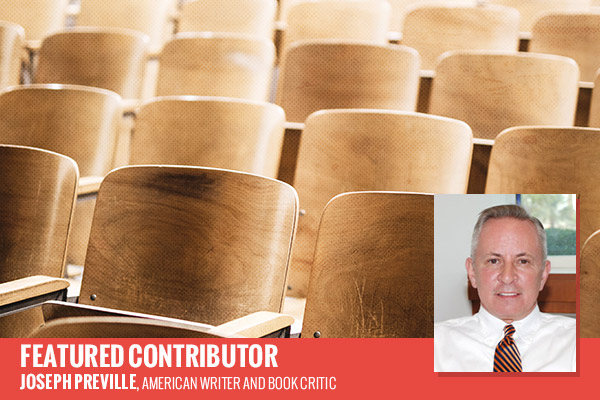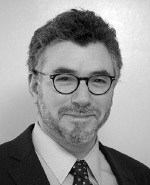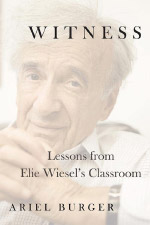
An Interview with Rabbi Ariel Burger, Author of ‘Witness: Lessons from Elie Wiesel’s Classroom’
- By Joseph Preville --
- 08 Jul 2019 --

“Listening to a witness makes you a witness.” – Elie Wiesel
Elie Wiesel (1928-2016) was an internationally-recognized writer, educator, and human rights activist. He was awarded the Nobel Peace Prize in 1986 for his witness to the horrors of the Nazi Holocaust. “We must always take sides,” he said in his acceptance speech. “Neutrality helps the oppressor, never the victim. Silence encourages the tormentor, never the tormented. Sometimes we must interfere. When human lives are endangered, when human dignity is in jeopardy, national borders and sensitivities become irrelevant.”
An Interview with Rabbi Ariel Burger, Ph.D. By Joseph Richard Preville[/tweetthis]
Wiesel was the Andrew W. Mellon Professor in the Humanities at Boston University from 1976-2013. His work as a professor is the focus of Boston Rabbi Ariel Burger, Ph.D.’s inspiring new book, Witness: Lessons from Elie Wiesel’s Classroom (Houghton Mifflin Harcourt, 2018). Burger writes about his twenty-five-year association with Elie Wiesel: “He was mentor, my guide, and eventually my friend. He helped me steer my way through complex questions of identity, religion, and vocation to a life of meaning I did not know was possible.”
Rabbi Ariel Burger, Ph.D. discusses his new book in this interview.
Joseph Richard Preville: You had a long association with Elie Wiesel. How did he help you to discover your vocation in life?
 Rabbi Ariel Burger: This is hard to answer briefly, and my book deals with this at length. But the core of it was that Professor Wiesel believed in me, listened to my questions, and encouraged me to pursue my dreams. He saw my potential as a teacher and writer, and gave me tools and space to develop in those areas.
Rabbi Ariel Burger: This is hard to answer briefly, and my book deals with this at length. But the core of it was that Professor Wiesel believed in me, listened to my questions, and encouraged me to pursue my dreams. He saw my potential as a teacher and writer, and gave me tools and space to develop in those areas.
JRP: How was teaching the core of Elie Wiesel’s personal mission?
RAB: As a Holocaust survivor who lost most of his family, Elie Wiesel’s choice to teach was a profound act of hope. The lesson he found in his experience was that we must do anything possible to prevent what he suffered from happening to anyone, ever again. He believed that the best way to do that was through education. By education, he meant the cultivation of sensitivity, of empathy, a joyful and urgent exploration of big ideas and questions that could transform students. As someone who dedicated his life to creating a better future, one free of genocide and oppression, he found no better task than helping create new, more sensitive, generations of students and future leaders.
JRP: What impact did Elie Wiesel have on the students in his classes at Boston University?
RAB: His impact was profound for so many. And it was different for each student. Students felt they were able to bring their personal questions to the classroom, and as a result, the literature Professor Wiesel taught came to life. The dialogue between the great books and their lives was inspiring and informative. Many students felt that, as a result of being in Elie Wiesel’s class, they had no choice but to be more compassionate, moral actors. By being in the presence of a person of great integrity, someone who acted in small and big ways to make the world better, he inspired them to do the same in their own ways.
JRP: Elie Wiesel said that “I believe in a wounded faith.” What do you think he meant by that statement?
RAB: He was drawing on an old Jewish tradition that begins with Abraham, a tradition of arguing with God as an expression of faith. Abraham tries to persuade God to save the city of Sodom; Moses argues with God on behalf of the Israelites; later Hasidic masters worked to convince God to forgive human beings. Elie Wiesel saw three old rabbis put God on trial in Auschwitz, for allowing such suffering to happen. They brought witnesses for the defense, and for the prosecution, and they found God guilty. Then they prayed the evening prayer. Their judgment of God did not preclude their devotion, just the opposite. For Elie Wiesel too, demanding that God live up to the ethical standards we expect of ourselves is an expression of faith. As he said, “I can be for God, and against God, but not without God.”
JRP: What international events and experiences shaped Elie Wiesel’s views on the importance of interreligious dialogue?

JRP: What did Elie Wiesel teach us about standing in solidarity with oppressed and marginalized people around the world?
He taught that this is critical. We must try to stop oppression and prevent genocide whenever possible, and we must not sleep well while people are suffering anywhere. (I owe him some of my insomnia, and am better for it.) But even when we cannot make a practical difference, we must at least protest. This act, even when it does not lead to the results we seek, is worthy. It lets the victims know they are not alone, and it ensures that we will not become infected by the corruption of apathy.
JRP: Like Albert Einstein, Elie Wiesel was offered, but declined, the position of president of the state of Israel. What was his relationship to Israel?
RAB: He loved Israel and saw it as the fulfillment of the promise is Jewish history. Never again would Jews live at the mercy of local leaders and communities. By taking their destiny into their own hands, the Jewish people rejected the continuation of 2,000 years of powerlessness. Professor Wiesel quoted someone in the camps who said, “God has not fulfilled His promise to us, but Hitler has.” Therefore, continuing a path of quietism and faith in God is no longer a reasonable or even a moral choice. He believed that Israel and the Palestinians would one day find peace, and he thought it would happen in his lifetime. He thought that everyday Israelis and Palestinians both wish for peace and safety, to raise their children without fear. And that gave him hope, even when peace seemed out of reach.
JRP: What does it mean to be a student of Elie Wiesel?
RAB: Most of all, it means remembering the past and understanding the link between past and future. It means choosing to care about others’ lives, their suffering and their joy. It means becoming a witness.



















